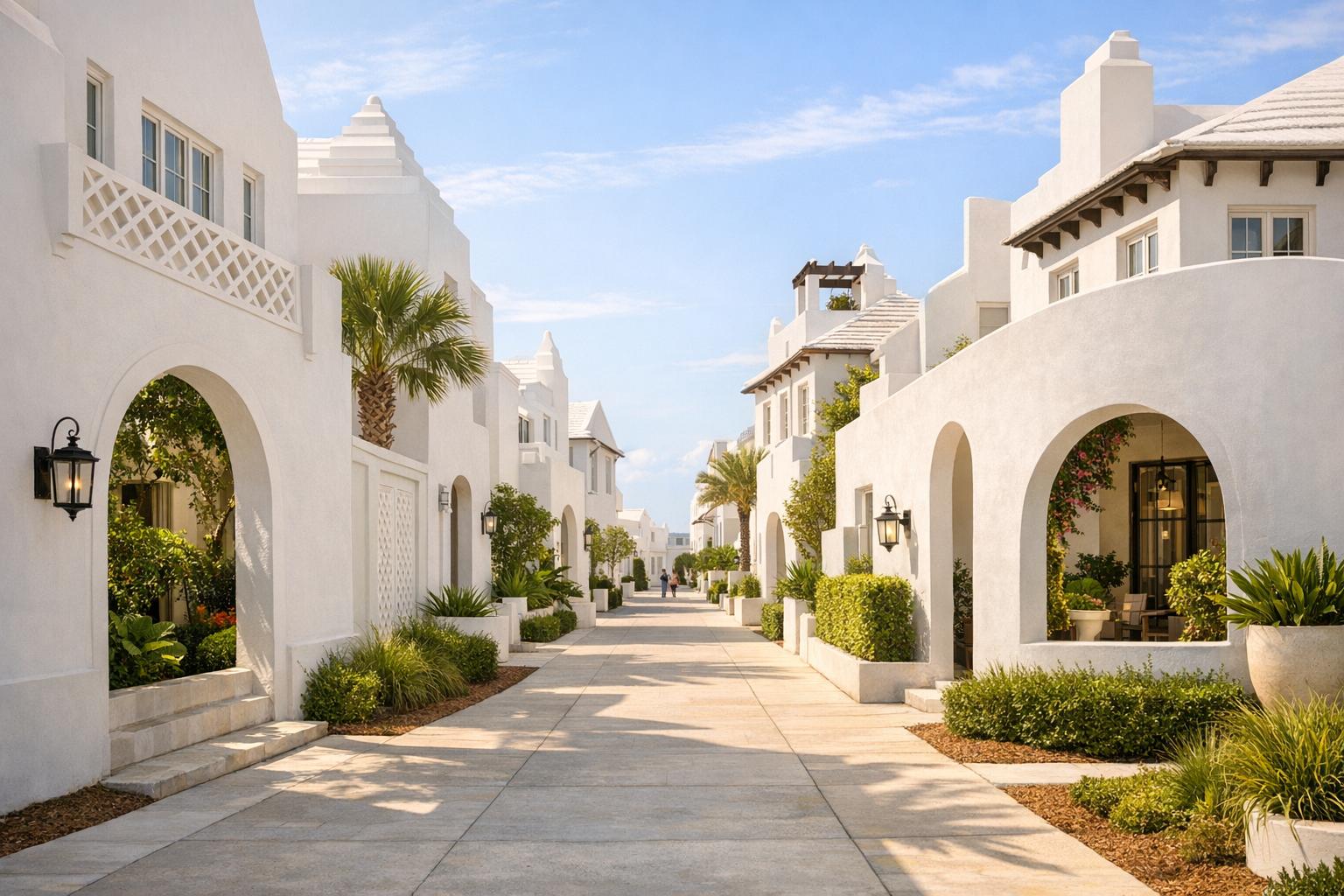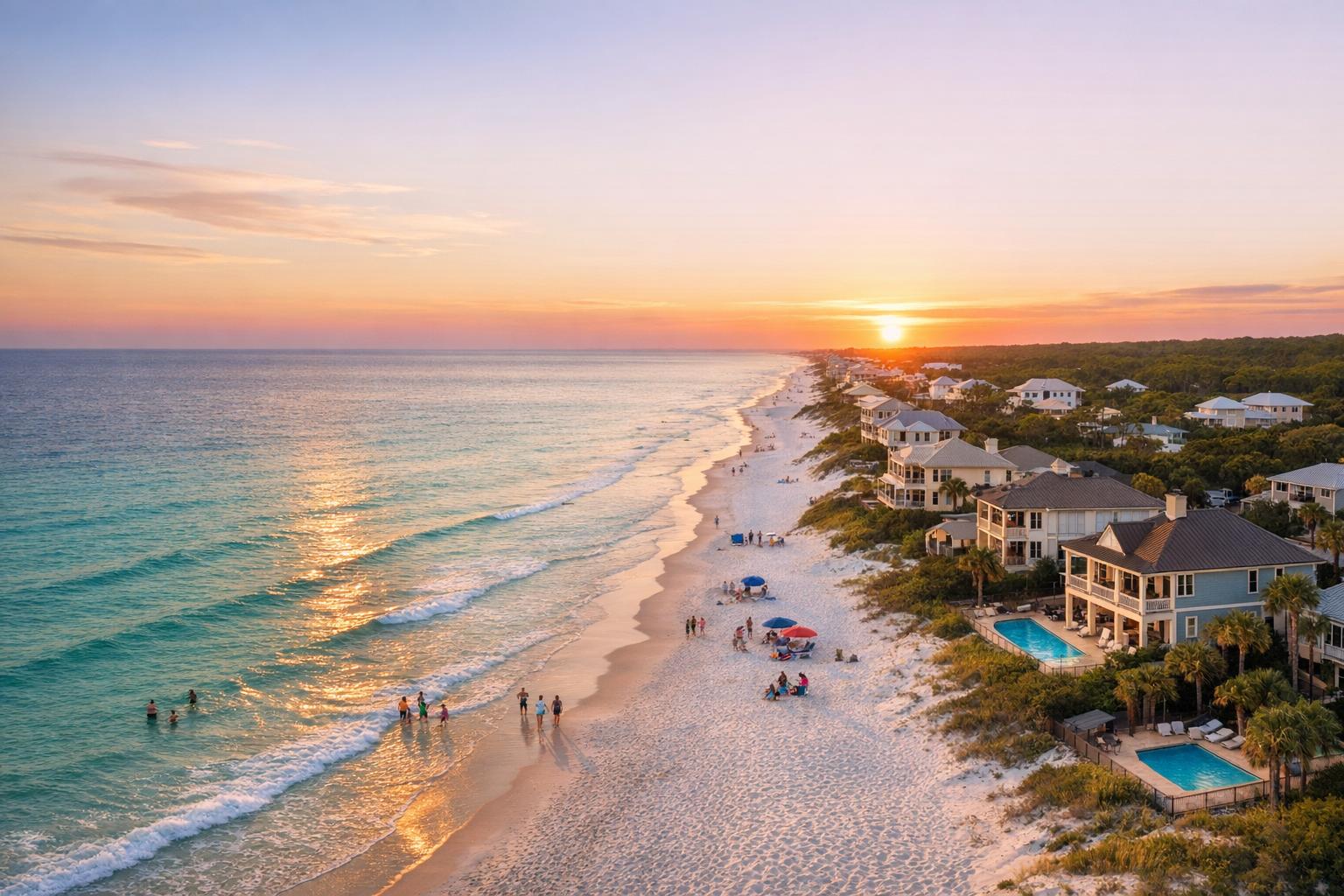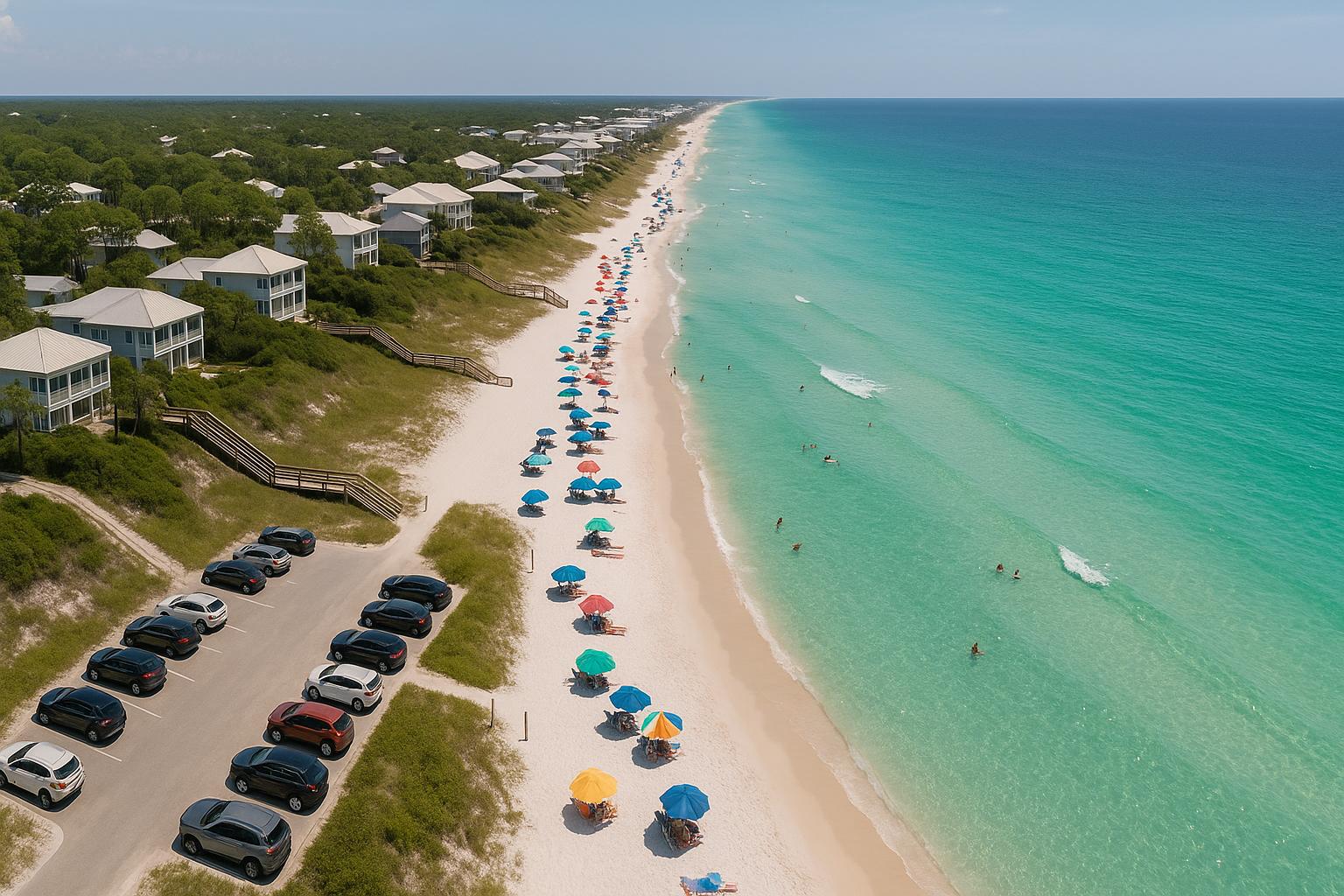Looking for the best spots for kayaking and paddleboarding along Florida’s scenic 30A? South Walton’s state parks are home to rare coastal dune lakes and calm Gulf waters, perfect for paddlers of all skill levels. Here’s a quick rundown of what each park offers:
- Grayton Beach State Park: Features Western Lake, the second-largest dune lake in the area. Ideal for families and beginners with rentals, picnic areas, and camping options. Entry: $5–$6 per vehicle.
- Camp Helen State Park: Home to Lake Powell, Florida’s largest coastal dune lake. Great for bird watchers and peaceful paddling. Entry: $4 per vehicle.
- Topsail Hill Preserve State Park: Offers three lakes, Gulf access, and extensive camping facilities. Entry: $6 per vehicle.
- Deer Lake State Park: A quieter, scenic retreat with a long boardwalk connecting to the lake and Gulf. No rentals available. Entry: $3–$4 per vehicle.
Each park provides a unique experience, from serene wildlife viewing to Gulf adventures. Rentals range from $20–$40, and early mornings are the best time to enjoy smooth waters. Respect these rare ecosystems by sticking to designated launch points and following leave-no-trace principles.
Quick Comparison Table:
| Park Name | Lake Size | Rentals Available | Key Features | Entry Fee |
|---|---|---|---|---|
| Grayton Beach State Park | 200+ acres | Yes (year-round) | Western Lake, camping, Gulf outfall | $5–$6 |
| Camp Helen State Park | ~800 acres | Yes (seasonal) | Lake Powell, family-friendly | $4 |
| Topsail Hill Preserve | 3 lakes | Yes | Wildlife, camping, Gulf access | $6 |
| Deer Lake State Park | Small | No | Scenic boardwalk, peaceful setting | $3–$4 |
Plan your trip, pack light, and enjoy paddling through some of the rarest ecosystems in the world. For more details, visit sowal.co.
Kayaking Western Lake at Grayton Beach State Park in Florida #graytonbeachstatepark
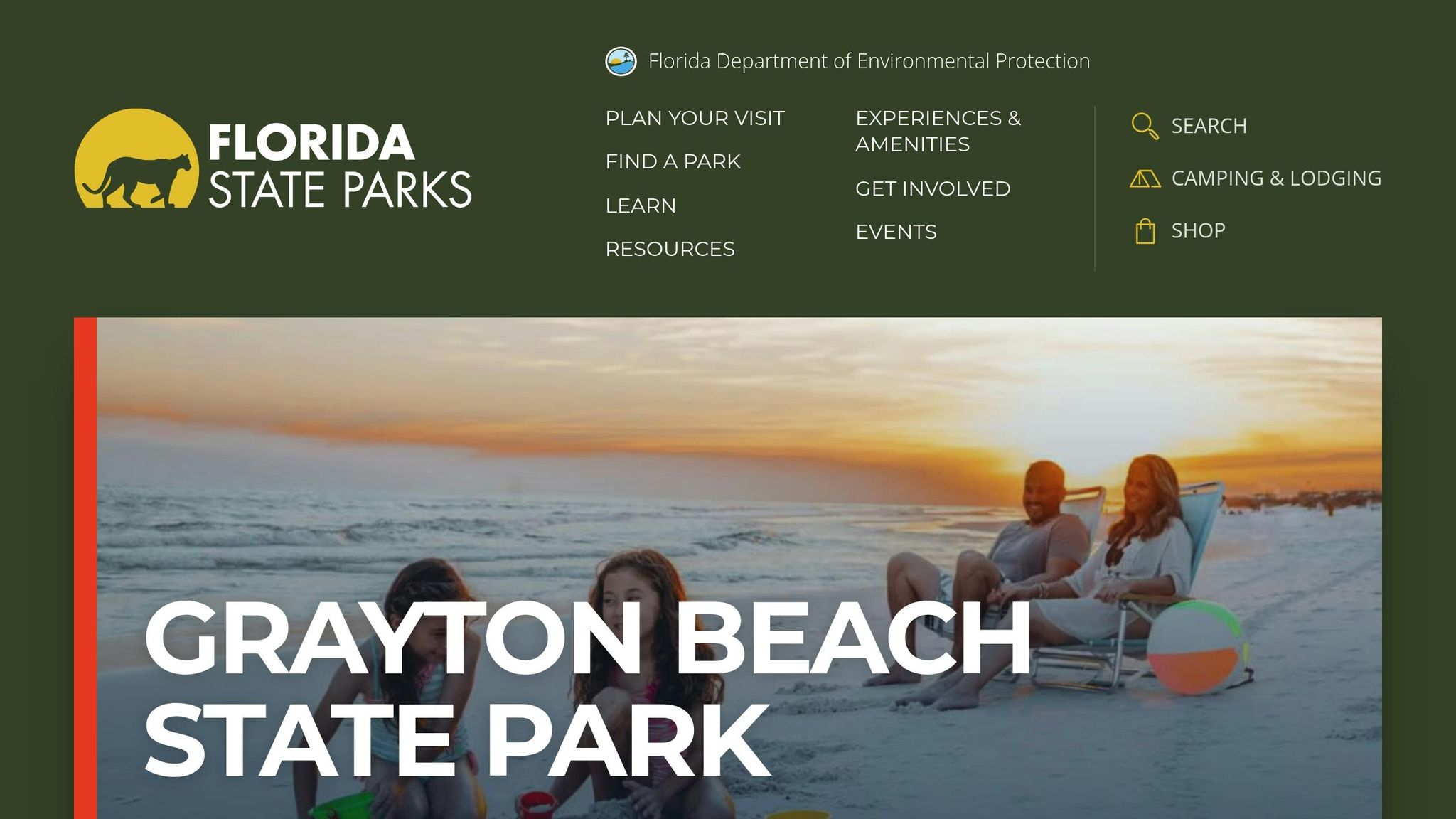
Grayton Beach State Park
Grayton Beach State Park, nestled along 30A, is a paradise for paddling enthusiasts. At its heart lies Western Lake, a haven for kayaking and paddleboarding. Spanning nearly 2,000 acres, this award-winning park offers everything from accessible launch points to overnight stays. Let’s dive into what makes Western Lake, the park’s amenities, and its camping options so special.
Western Lake Features
Western Lake stretches across 200 acres of calm, brackish water, framed by pristine white sand dunes. As the second largest coastal dune lake in the area, it offers plenty of room for paddlers, even on busy weekends. After heavy rains, the lake’s outfall may connect directly to the Gulf of Mexico, creating a unique mix of freshwater and saltwater. The surrounding landscape - pine flatwoods, scrub oaks, and magnolia forests - acts as a natural windbreak, ensuring the waters stay calm and inviting.
Paddlers can explore salt marshes teeming with wildlife. Keep an eye out for herons, ospreys, and even bald eagles overhead, while the clear waters below often reveal turtles and fish. Visitors consistently rave about the lake’s beauty and paddling conditions, earning it a stellar 4.9 out of 5 rating.
Park Amenities and Activities
To make your paddling adventure seamless, the park features a dedicated boat ramp and convenient parking. If you don’t have your own gear, no problem! The Friends of Grayton Beach and Deer Lake State Parks operate a rental station offering kayaks, canoes, and paddleboards, complete with paddles and life vests. Rentals range from $30–$40 for a half-day, and the park’s entry fee is around $5–$6 per vehicle.
Beyond the water, the park offers picnic pavilions, clean restrooms, and designated wildlife viewing areas. Pet owners will appreciate the pet-friendly zones, though pets must remain leashed at all times.
Camping and Trails
For those who want to stay overnight, Grayton Beach State Park provides 61 campsites for tents and RVs, some of which include sewer hookups. Additionally, there are 30 cozy cabins available for rent, but be sure to book cabins up to 11 months in advance during peak seasons.
The park is also a designated stop on the Great Florida Birding Trail, making it a prime spot for birdwatching. If you’re up for exploring on foot or bike, the park boasts over four miles of trails. A standout is the 1-mile nature trail, which showcases the park’s unique dune and salt marsh ecosystem. These trails offer a perfect way to immerse yourself in the park’s diverse landscapes between paddling sessions.
Camp Helen State Park
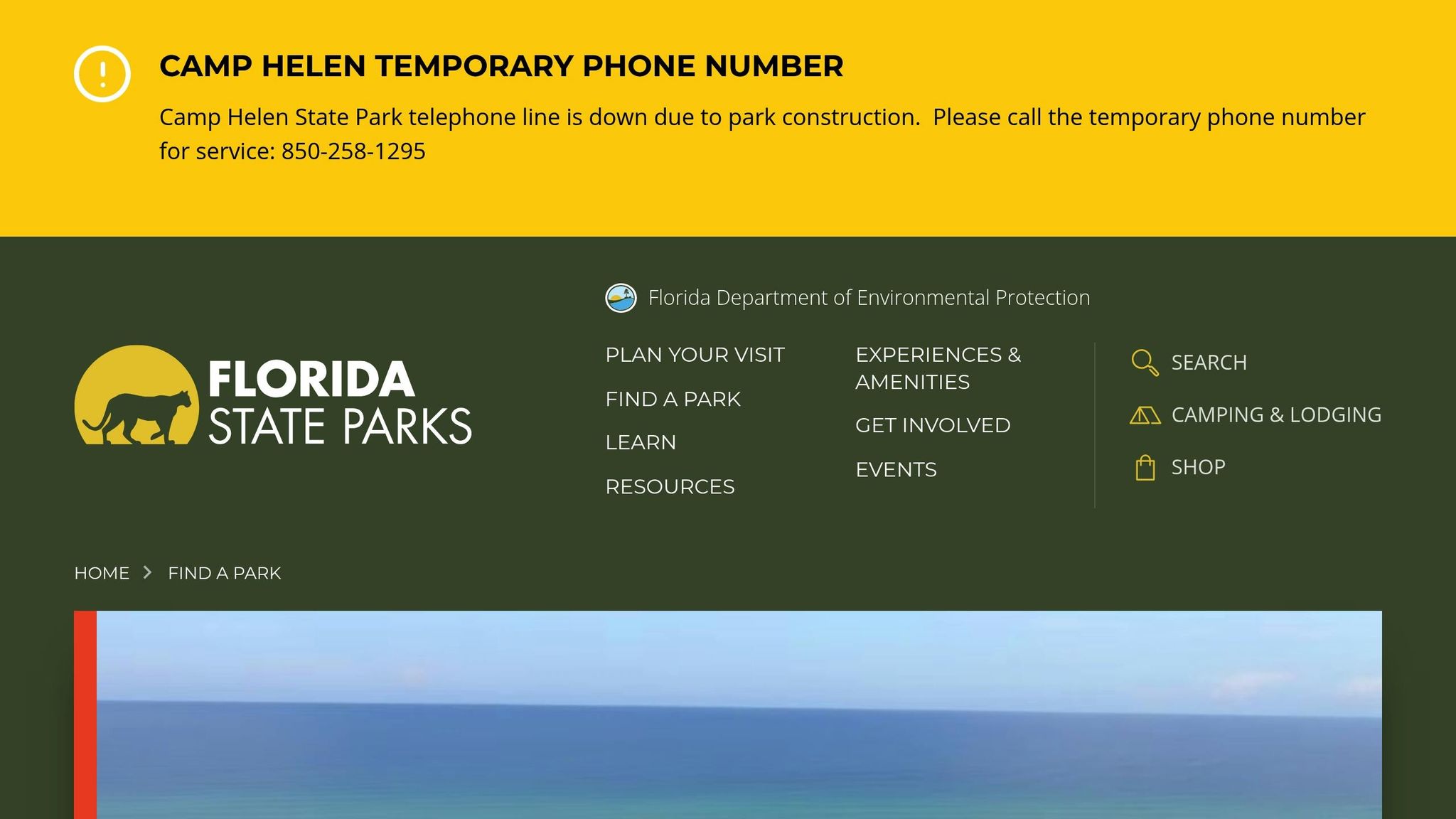
Camp Helen State Park is home to Lake Powell, the largest coastal dune lake in Florida and one of the largest in the world, covering about 180 acres. This unique park combines the beauty of Gulf beaches with the tranquility of a vast lake, offering plenty of opportunities for paddling and relaxation. Here’s a closer look at what makes Lake Powell so special, along with the activities and natural beauty it offers.
Lake Powell Overview
Lake Powell is a rare mix of freshwater and saltwater, thanks to its connection to the Gulf of Mexico. This creates a habitat for a wide variety of fish, including Speckled Sea Trout and Redfish. The area is also a haven for bird enthusiasts, with wading birds, ospreys, and even dolphins occasionally spotted near the outfall where the lake meets the Gulf.
Family Activities
The park makes it easy for families to enjoy the water with kayak and paddleboard rentals available from spring through fall. Launch facilities are thoughtfully designed with gentle slopes and paved trails, making them accessible for strollers and wheelchairs. Visitors will also find ample parking, picnic spots, and clean restrooms, ensuring a hassle-free day of fun. The launch area, conveniently located near the main parking lot, allows for quick and easy access to the water, making it perfect for a full day of adventure.
Natural Environment
Camp Helen State Park is a peaceful retreat, featuring the untouched shorelines of Lake Powell surrounded by coastal forests and pristine dunes. Without the noise of motorized boats, the lake remains calm and inviting for paddlers. Whether you’re exploring the lake or heading to the Gulf beach with a short portage, the serene environment is sure to captivate. Early mornings bring a magical mist and active wildlife, adding to the park’s charm. Best of all, the entrance fee is modest, keeping this slice of paradise affordable for everyone.
Topsail Hill Preserve State Park
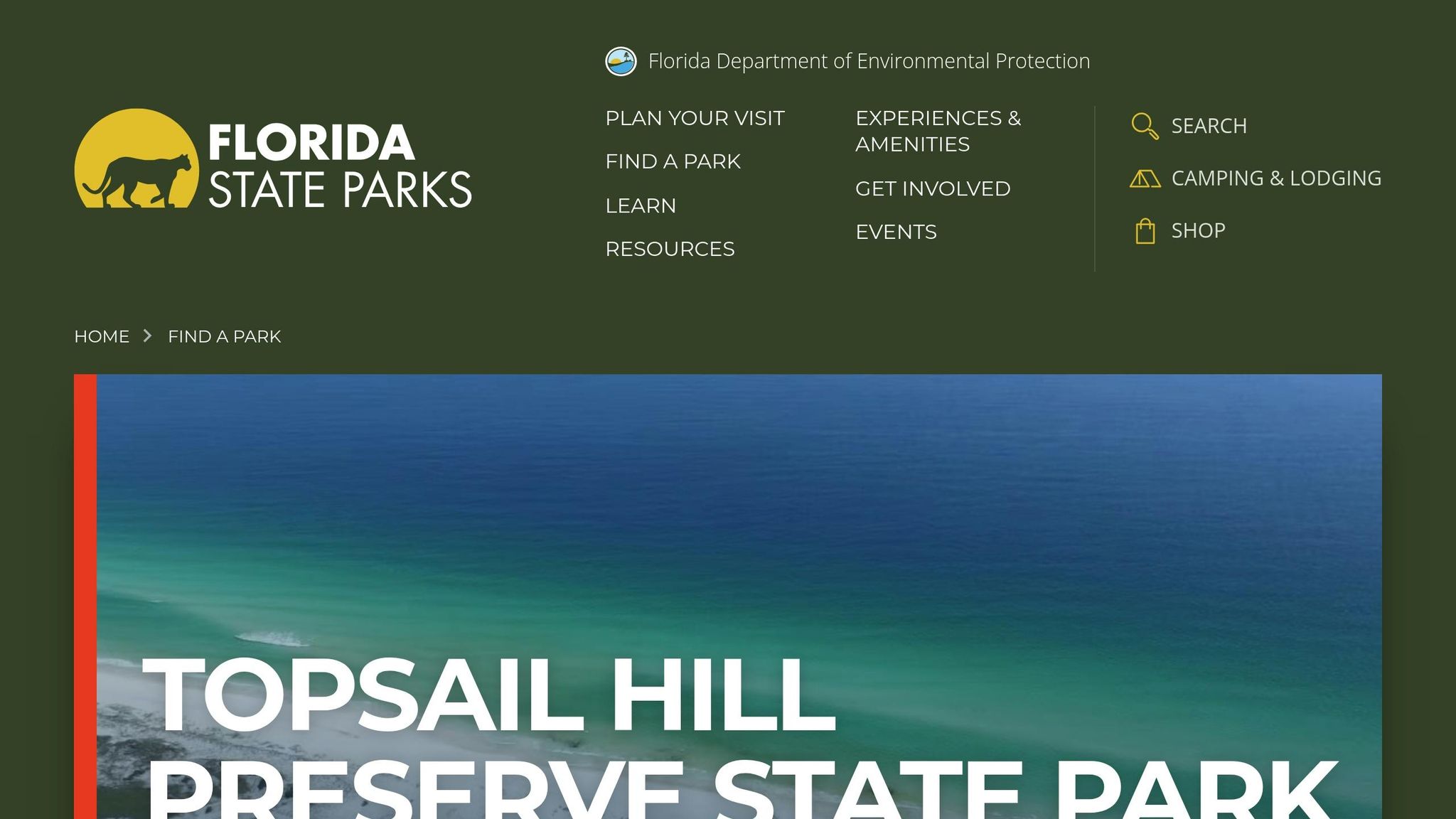
Topsail Hill Preserve State Park, nestled along 30A, is a paradise for paddling enthusiasts. This 1,640-acre park boasts three rare coastal dune lakes and over three miles of unspoiled Gulf coastline. Whether you're just starting out or looking for a more daring adventure, the park offers a mix of calm freshwater lakes and open Gulf waters to explore.
Paddling and Recreation
The park’s three coastal dune lakes - Campbell, Morris, and Stallworth - create a unique paddling environment. These tranquil, sheltered waters are perfect for families and beginners. If you don’t have your own gear, on-site rentals are available, typically costing between $20 and $40 for two hours.
For those drawn to the Gulf, the park’s sugar-white sand beaches provide access to open waters. A tram service makes it easier to transport your gear to the more remote beach access points. Beyond paddling, the park offers picnic areas, hiking and biking trails, and fishing spots, making it a hub for outdoor recreation. The mix of freshwater lakes and Gulf waters also means you’re likely to encounter a variety of wildlife along the way.
Wildlife and Scenery
Topsail Hill Preserve is part of the Great Florida Birding Trail, making it a hotspot for birdwatching and photography. Early mornings often bring sightings of wading birds, ospreys, and seasonal migratory species. The park’s towering sand dunes, some reaching heights of 25 feet, provide a stunning backdrop to the untouched coastline.
Camping Options
If a day trip isn’t enough, the park offers plenty of overnight options. With 156 RV sites, 22 tent sites, and 32 cabins and bungalows, there’s something for everyone. Camping here allows for early morning paddles, peaceful sunset excursions, and a chance to fully immerse yourself in nature. RV and tent sites are priced at around $42 per night, while cabins and bungalows range from $100 to $130 per night.
Deer Lake State Park
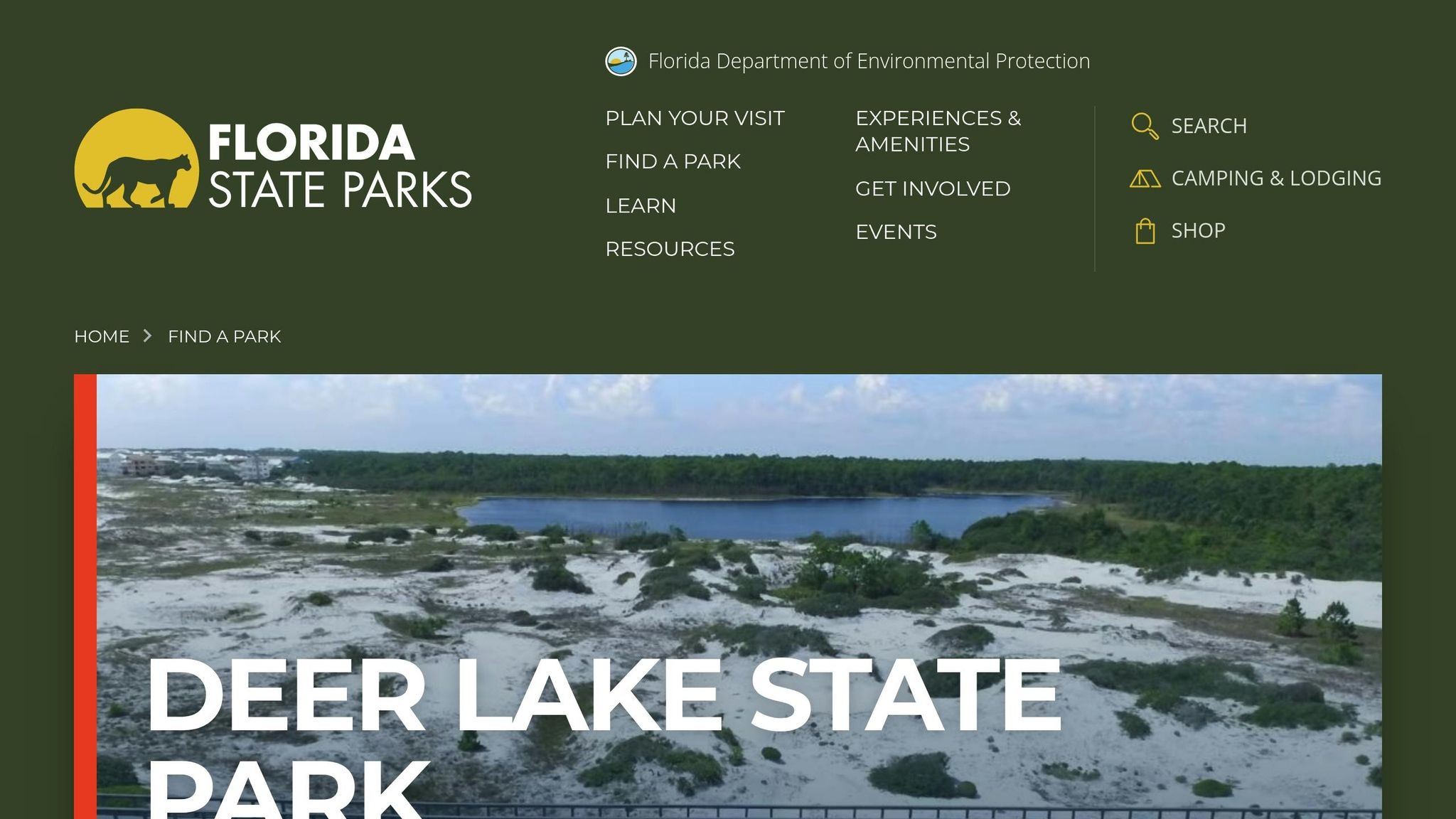
Deer Lake State Park is a serene escape for paddling enthusiasts along 30A, offering a quiet retreat surrounded by natural beauty. Unlike some of the busier parks in the area, Deer Lake provides a more intimate paddling experience. The park is home to a rare coastal dune lake, framed by rolling dunes and native plants like scrub oaks and Southern magnolias. Its standout feature? A boardwalk that seamlessly connects visitors to both the lake and the Gulf.
Lake and Gulf Access
One of the park's highlights is its elevated boardwalk, which happens to be one of the longest in South Walton. This boardwalk stretches from the parking area to Deer Lake and the Gulf of Mexico. Paddlers can launch their gear directly into the calm waters of Deer Lake and, with ease, transition to the Gulf for open-water adventures. Coastal dune lakes like this are incredibly rare, making the experience here even more special.
Park Scenery
The scenery at Deer Lake State Park is truly something to savor. The rolling dunes, shaped by coastal winds, provide a unique landscape that supports rare plant species like Curtiss' sandgrass - the largest population of its kind in Florida. The area is also a haven for wildlife lovers. Early morning paddlers might spot a variety of birds, deer, and, on rare occasions, even a Florida black bear.
Visitor Preparation Tips
If you're planning a paddling trip, a little preparation goes a long way. The park has limited facilities - there are no concessions, minimal restroom access, and no equipment rentals available. Be sure to bring your own water, snacks, and sun protection. Arriving early is recommended, as the small parking lot tends to fill up quickly during busy times. Keep in mind that getting to the water requires a long walk along the boardwalk, so pack light and efficiently.
Before heading out, check the weather and tide conditions, and confirm any park-specific regulations with staff. Restrictions on watercraft use may apply, and it's important to respect the wildlife and stick to designated launch areas to help preserve the park's natural beauty.
sbb-itb-d06eda6
Park Comparison for Paddlers
Looking for the perfect spot to paddle along 30A? Each state park offers its own charm, catering to different paddling preferences with a mix of rental options, lake sizes, and standout features.
Feature Comparison Table
| Park Name | Lake Size | Rentals Available | Launch Facilities | Key Features | Best For |
|---|---|---|---|---|---|
| Grayton Beach State Park | 200+ acres | Yes (year-round) | Boat ramp, large parking area | Access to Western Lake, towering dunes, Gulf outfall | Beginners, families, rental convenience |
| Camp Helen State Park | ~800 acres | Yes (seasonal) | Easy lake access, ample parking | Largest dune lake, less crowded, family-friendly | Open water exploration, avoiding crowds |
| Topsail Hill Preserve State Park | 3 lakes (varied sizes) | Yes | Multiple launch points | Access to Campbell, Morris, and Stallworth Lakes; extensive amenities | Wildlife viewing, camping, variety |
| Deer Lake State Park | Small | No | Long boardwalk to water | Scenic boardwalk, rare plants, peaceful setting | Quiet paddling, nature lovers |
All parks charge Florida state park entrance fees, ranging from $4 to $6 per vehicle. For those seeking tranquility, Deer Lake State Park is the quietest choice, followed by Camp Helen State Park. Grayton Beach and Topsail Hill Preserve see more visitors, especially on summer weekends and holidays, but their larger facilities help manage the crowds.
Take a moment to match your paddling style with the park that best suits your needs before diving into our paddling safety and preparation tips.
Responsible Paddling Tips
The coastal dune lakes of South Walton rank among the rarest ecosystems on the planet – these unique waterways are found in only five locations worldwide. This rarity makes each paddling trip a special opportunity, but it also comes with a responsibility to protect these fragile environments. By following a few thoughtful practices, you can help preserve these ecosystems while enjoying your adventure.
When paddling, it’s crucial to navigate with care to protect the delicate salt marshes. These brackish waters are home to specialized fish species like Speckled Sea Trout and Redfish. Stick to designated channels and avoid shallow areas with vegetation. The salt marshes you see are vital nurseries for fish and feeding grounds for birds, so admire them from open water instead of venturing too close.
Wildlife encounters are one of the joys of paddling here, but they call for respectful observation. South Walton’s state parks are part of the Great Florida Birding Trail, and you might spot bald eagles or osprey, especially during their spring and early summer nesting seasons. Keep a safe distance from nests, avoid sudden movements or loud noises, and use binoculars for a closer look rather than approaching wildlife directly.
Always launch your paddleboard or kayak from designated areas to protect shoreline vegetation and prevent erosion. State parks like Grayton Beach and Camp Helen provide boat ramps designed to minimize environmental impact. When you land, look for sandy spots instead of vegetated areas, and avoid dragging your equipment through marsh grasses or across dunes.
Stick to leave-no-trace principles by packing out all trash to keep these habitats pristine. Also, be mindful of the chemicals you bring into the water. Avoid applying sunscreen or insect repellent right before paddling, as these substances can harm aquatic life.
Choosing the right time for your paddling trip can make a big difference for the environment. Early mornings often bring calmer waters, reducing the need for aggressive paddling that stirs up sediment or disturbs wildlife. To lessen the impact of human activity, consider avoiding peak times like summer weekends and holidays when visitor numbers are highest.
Paddling at a relaxed pace and keeping noise to a minimum benefits both the environment and other visitors. Popular spots like Grayton Beach’s Gulf outfall often have families wading and swimming alongside paddlers. Move slowly through these areas, avoid creating wakes that could erode the shoreline, and keep the noise down to maintain the tranquility for everyone.
For the latest updates on wildlife activity, seasonal restrictions, or designated paddling routes, consult park staff. Rangers at Grayton Beach State Park (850-267-8300) or the Friends of Grayton kiosk can provide valuable information about nesting birds, spawning seasons, or temporary access limitations. Staying informed helps ensure both your safety and the protection of the environment.
Lastly, remember that your entrance fees and responsible behavior directly contribute to conservation efforts that protect these ecosystems for future generations. If you notice environmental damage or wildlife disturbances, report them to park management. You might also consider joining a beach cleanup or a citizen science program to further support preservation efforts. Responsible paddling is proof that enjoying nature and protecting it can go hand in hand.
Visitor Information
If you're planning a paddling trip to South Walton's state parks, it's important to know a few key details. Entry fees range from $3 to $6 per vehicle, depending on the park. For example, Grayton Beach State Park charges between $5 and $6 per vehicle, while Deer Lake State Park is a more affordable option at $3 to $4 per vehicle. Topsail Hill Preserve State Park has a $6 entry fee, and Camp Helen State Park charges $4 per vehicle. If you're arriving on foot or by bike, expect to pay around $2 per person.
Rentals and Reservations
Before heading out, check the availability of rental equipment. Rental rates typically range from $20 to $40 for a few hours, and they usually include paddles and life vests. Since rental options can vary between parks, it's a good idea to confirm specific details ahead of time. Keep in mind that equipment often sells out quickly during weekends and holidays, so arriving early or calling the park office for updates is a smart move. Campsites and some equipment rentals can also be reserved online through the Florida State Parks reservations website or by phone.
Operating hours for most parks are from 8 a.m. until sunset, but rental schedules may not always align with general park hours. Double-check the timing to avoid any surprises.
Safety and Regulations
Safety is a top priority. Florida law requires all paddlers to wear life vests, which are provided with rentals. Minors must be supervised by an adult, and rental providers may have additional age or safety requirements. Planning to fish? Don’t forget you’ll need a valid Florida fishing license.
If you're bringing your own paddling gear, most parks have designated launch ramps. However, restrictions may apply - Deer Lake State Park, for instance, has specific rules for personal equipment. Launching is generally allowed during regular operating hours, though special events or high water conditions may temporarily limit access.
Essential Tips for Your Trip
- Check the weather: Coastal dune lakes can be windy, and the sun can be intense. Bring sun protection, plenty of water, and dress appropriately.
- Stick to calm waters: If you're new to paddling, avoid rough Gulf waters and stay in safer areas.
- Share your plans: Let someone know your itinerary, and keep a cell phone in a waterproof case for emergencies.
Amenities and Programs
Beyond paddling, the parks offer amenities to enhance your visit. Grayton Beach and Camp Helen State Parks feature ample parking, restrooms, picnic pavilions, and convenient access to launch points. Some parks even provide changing rooms and outdoor showers, though amenities may vary. For the latest details on facilities, rental rates, and availability, contact the park office or visit the official Florida State Parks website.
Seasonal programs, such as ranger-led activities, group paddling tours, and special events, are also available, especially in the spring and summer. Information about these programs is usually posted on the Florida State Parks website, on park bulletin boards, or can be obtained by calling the park office. Some activities may require advance registration and a small fee.
With a little preparation, your paddling adventure can be a fun and safe way to explore South Walton's beautiful state parks.
Conclusion
South Walton's state parks provide a paddling experience like no other along Florida's scenic 30A coastline. Whether you're gliding through the calm waters of Grayton Beach and Camp Helen or discovering the serene beauty of Topsail Hill Preserve's freshwater lakes and Deer Lake's hidden boardwalks, there's a perfect spot for every paddler.
What sets this area apart is its rare coastal dune lakes - ecosystems so unique they can only be found in five places worldwide. Every paddle here offers not just a chance to explore but to connect with something truly extraordinary.
Whether you're just starting out or have years of paddling experience, South Walton offers a mix of peaceful lakes and Gulf waters to suit all skill levels. Thanks to the mild climate and plenty of rental options, you don’t even need to own your own gear to dive in.
From family-friendly parks to more secluded escapes, each location has its own charm. The combination of easy access, diverse landscapes, and stunning natural beauty makes South Walton's state parks a must-visit for anyone who loves the outdoors.
So grab your sunscreen, plan your trip, and get ready to paddle through some of nature’s most remarkable waterways. For tips and final details, head over to sowal.co and start planning your adventure along 30A.
FAQs
What makes coastal dune lakes special for kayaking and paddleboarding in South Walton's state parks?
Coastal dune lakes are extraordinary natural features found in just a handful of locations across the globe, with South Walton, Florida, being one of those lucky spots. What makes them stand out is their ability to blend freshwater with occasional saltwater influxes from the Gulf of Mexico, resulting in a constantly shifting and rich ecosystem.
For those who love paddling, these lakes are a dream come true. The calm, glassy waters are surrounded by vibrant, green landscapes, making them ideal for kayaking or paddleboarding. Add to that their serene atmosphere and close connection to South Walton's state parks, and you've got an adventure that’s both peaceful and packed with natural beauty.
What safety tips or regulations should I know before kayaking or paddleboarding in South Walton's state parks?
When you're kayaking or paddleboarding in South Walton's state parks, keeping safety top of mind is key. Start by wearing a U.S. Coast Guard-approved life jacket - it's non-negotiable. Also, take a moment to check the local weather forecast before heading out, as conditions can shift quickly. Respect the area's wildlife by steering clear of their habitats and avoiding any disturbances.
Each park may have its own set of rules, like designated launch spots or restricted zones, so take a minute to review signage or check in with the park office for specific details. To make your outing more comfortable, pack sunscreen, plenty of water, and a whistle or signaling device in case of emergencies. Stay alert, prepared, and enjoy the serenity of the water safely!
When is the best time to visit South Walton's state parks for kayaking and paddleboarding to enjoy great conditions and fewer crowds?
The ideal time to explore South Walton's state parks for kayaking and paddleboarding is in the spring (March through May) or fall (September through November). During these months, you can enjoy pleasant temperatures, calmer waters, and a more peaceful atmosphere compared to the bustling summer season.
For an even quieter outing, plan your visit on a weekday or head out early in the morning - weekends and afternoons usually draw larger crowds. And don’t forget to check the local weather forecast beforehand to ensure conditions are safe and perfect for your paddling adventure.
